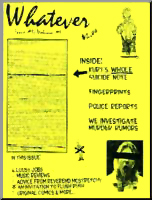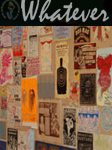HEALTH CARE NIGHTMARE
Submitted By The President of the National Association of
Twentysomethings, Jennifer Klein
After my graduation from college I went to work for a large firm in New York City and joined an employer sponsored HMO. I wasn't crazy about the hours my HMO kept, but I was covered. I remained happy and healthy for three years until my company closed their New York office. I decided not to go with them to Los Angeles, (mainly because I was not asked to), and instead look for a new job. By now I had gotten used to my doctors and their bizarre hours so I decided to continue paying for my same health insurance. I looked ad looked for a job, safe in the knowledge that i f I was run down by a cross-town bus, I would be covered.
Then two things happened--well, technically two things didn't happen. I didn't fall seriously ill, or get sick, or get run down. I seemed to be in perfect health. I couldn't remember the last time I had even gotten the sniffles. The other thing that didn't happen was I didn't get a job. I was now faced with a decision. It was a tough one, and like millions of our generation faced with the same decision I made the 100 percent wrong choice. I decided t o forego my health insurance.
Now wait, listen to my reasoning. I am really healthy (knock on wood), I haven't been sick in over a year, and I look both ways before crossing the street. So you see, I'm shelling out big bucks every month for something I don't use. And now that I've been unemployed for several months and my savings is dwindling. It came down to a choice between health insurance I didn't feel I needed and being able to have a night out on the town after a tough week of job hunting. The choice was clear. I jettisoned my health insurance and saved something like $150.00 per month . (Had I needed major surgery I would have been able to buy 3 minutes of anesthetic with my monthly savings.)
The real problem arose a year and a half later. I still didn't have a job, I had moved to two different cities and was now beginning my job search in a new city with my fiance. As luck would have it, he didn't have insurance either. We were both gambling with something big time. Whenever family members brought it up we were able to steer the conversation elsewhere, like to out impending wedding, or the Winter Olympics where the Tonya and Nancy Show raged. Finally, we got caught up in a lie and my fiance's uncle found out neither of us wa s covered.
He hit the roof as the news spread through our families like Ebola. Parents and grandparents were going to descend on us with charts and graphs to put out stupidity into perspective. (Apparently on the Stupid Scale we went right off the chart--imagine a parent telling a child they think they made the wrong call?!) My fiance's aunt had a brother in insurance and he set us up with a short term ca tastrophic plan.
We paid a few hundred dollars per month and we would be covered in the event of that bus accident, or if the safe dropped out of a window and hit me on the head, or if my fiance's appendix suddenly burst in the middle of the night. Now mind you, we still couldn't just go to the doctor-- I think out deductible was about $2,000 per year each. This was only insurance in case of a medical emergency.
My fiance and I continued to look for work in our adopted city while he worked at a restaurant. We hung out drinking after hours at the restaurant--as is the wont of food service people--and he got around to talking about the insurance issue. Amazingly, almost nobody had insurance. A few people were still in college and as such were covered on their parentÕs plan, and a few of the older workers took advantage of the outrageously expensive plan the restaurant offered or were covered under a spouse's plan, but the majority were gambling with their health every day.
So what's the gamble, you ask? It's a choice, you say matter-of-factly. If I get sick or need emergency care, it'll be my own fault and I accept that, you say nonchalantly. Well, try not to be stupid- or should I say, stupider? You have demonstrated how stupid you are by opting to not have insurance in the first place. A stupid person accepting responsibility for something ca used by their own stupidity is like the Magna Carta and the Pythagorean Theorem--they just don't matter to each other. It is your family that will have to sell their homes and cars, cash in retirement accounts and all of their savings for you to get an a ppendectomy or to keep you on life support after you fall and hit your head during a Mardi Gras celebration.
The bottom line is, you need health insurance. I understand thinking you are invincible. I understand paying for something you might not ever use. But the simple truth is, our health care system is so screwed up right now, there is no way you could pay for health care on your own without insurance. It is the way the system is designed. The cost of standard health care items in this country is staggering. And our generation, more than any other, often opts to go without insurance, or works in par t time temporary jobs and as such is not afforded health care coverage.
In the fall of 1995, I started the National Association of Twentysomethings (NAT) to help our generation with many of the problems it faces today. These include: a shrinking job market, a negative perception by the general public perpetuated by the m edia, under-representation in government which means politicians prefer screwing us since we rarely fight back, and a health insurance gap way out of proportion with our generations.
NAT is non-profit and offers benefits which assist Twentysomethings in these and other areas, but to me, the most important benefit we offer is access to group rate health insurance. We fought long and hard with insurers in all fifty states to get de cent rates on everything from comprehensive coverage like HMOs or old-fashioned 80-20 plans to catastrophic plans for the rare, but dangerous runaway bus, free-falling safe incidents mentioned earlier.
For the annual dues of $10 members receive a host of other services, like a national job resource center and resume bank, free financial planning, and discounts on magazines, movie tickets, car and truck rentals, and hotel rates. We also keep an eye on Washington to make sure we are looked out for--guarding against anothe r situation like the Clinton Administration's Health Care Fiasco of 1993 which would have had Twentysomethings paying, not only for their own health care, but for that of senior citizens in their neighborhood as well.
By far, our most important benefit is access to health insurance.
Our generation goes without it at an alarming rate. I urge you to call us at (800) 941-4711 and talk to somebody in our Benefits Division. Even if you have some form of health insurance, the group rates our members receive might be better. Take it from
a reformed gambler--it isn't worth gambling with your health. Winners save a few hundred dollars a year, but losers lose everything they and their families once had.








